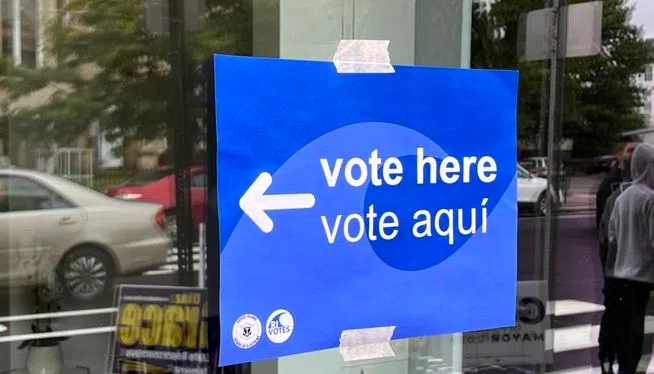
WASHINGTON (AP) — Voters in the pivotal swing state of Wisconsin and three Northeastern states will have a chance to indicate their support or opposition to their parties’ presumptive nominees in presidential primaries Tuesday. Wisconsin voters will also decide the fate of two Republican-backed statewide ballot measures that will shape how elections in the state are run and funded.
Farther south, Arkansas and Mississippi voters will return to the polls to decide a handful of legislative seats that were forced to runoffs in primaries held in March.
Although multiple names remain on the presidential ballots in Wisconsin, Connecticut, New York and Rhode Island, President Joe Biden and former President Donald Trump face no major challengers and already have secured more delegates than they need to win their parties’ nominations at the conventions this summer. Voters in Connecticut and Rhode Island will have the additional option of voting “uncommitted” if they want to register a protest vote against Biden, a Democrat, or Trump, a Republican. Wisconsin voters have a similar option, although it’s called “Uninstructed Delegation” on their ballot.
Delaware was also scheduled to hold a Republican presidential primary on Tuesday, but the contest was canceled on March 19 after former candidate Nikki Haley had her name removed from the ballot, leaving Trump the only remaining candidate. A Democratic primary there would also have been held Tuesday, but Biden was the only candidate to file for the ballot, so the event was never scheduled. In both cases, the parties awarded all the state’s delegates to Biden and Trump, as they were the only candidates remaining in their contests.
DECISION NOTES
In the presidential race, Biden and Trump are the favorites in their primaries as neither candidate faces a strong challenge. In all four contests, the first indications that they are winning statewide on a level consistent with the overwhelming margins seen in most other contests held this year may be sufficient to determine the statewide winners.
For the Wisconsin constitutional amendments, the fault lines hew closely to traditional partisan lines, with Republican state lawmakers backing the two measures and Democrats in opposition. Thus, the state’s vote history and political demographics will inform the race-calling process.
As for the races in Arkansas and Mississippi, runoffs tend to be lower-turnout events than the initial elections that prompted them. For local races, in which turnout for regularly scheduled elections is already relatively low, this could slow the race-calling process in particularly close contests since determining the outcome could rest on a handful of votes. For example, in Arkansas state House District 63, only 108 votes separated the first- and second-place candidates, out of 1,700 total votes cast.
The Associated Press does not make projections and will declare a winner only when it’s determined there is no scenario that would allow the trailing candidates to close the gap. If a race has not been called, the AP will continue to cover any newsworthy developments, such as candidate concessions or declarations of victory. In doing so, the AP will make clear that it has not yet declared a winner and explain why.
Here are the April 2 contests at a glance:
DELEGATES AT STAKE ON TUESDAY
Democrats: 436
Republicans: 179
STATES WITH PRESIDENTIAL PRIMARIES (4)
Connecticut, New York, Rhode Island, Wisconsin
STATES WITH NON-PRESIDENTIAL PRIMARIES AND ELECTIONS (3)
Arkansas (runoff), Mississippi (runoff), Wisconsin
TUESDAY TIMELINE
8 p.m. EDT: All polls close in Connecticut, Mississippi, Rhode Island
8:30 p.m. EDT: All polls close in Arkansas
9 p.m. EDT: All polls close in New York, Wisconsin
ARKANSAS
STATE HOUSE PRIMARY RUNOFF, DISTRICT 35 (D): Jessie McGruder, Raymond Whiteside
STATE HOUSE PRIMARY RUNOFF, DISTRICT 63 (D): Fred Leonard, Lincoln Barnett
STATE HOUSE PRIMARY RUNOFF, DISTRICT 88 (R): Arnetta Bradford, Dolly Henley
WHO CAN VOTE: Voters who participated in the March 5 primary for a specific seat may only vote in the same party’s runoff for that seat. In other words, voters who cast ballots in the Republican primary on March 5 may not vote in a Democratic runoff for the same seat. Voters who did not participate in any party’s primary for a specific seat on March 5 may also participate in the runoff. All voters must be registered in the district holding the runoff.
FIRST VOTES REPORTED (March 5 primary): 8:36 p.m. ET
LAST ELECTION NIGHT UPDATE: 3:28 a.m. ET with about 99.7% of the total votes counted
CONNECTICUT
PRESIDENTIAL PRIMARY (D): Biden, Dean Phillips, Marianne Williamson, Cenk Uygur, “Uncommitted.” 60 delegates at stake
PRESIDENTIAL PRIMARY (R): Trump, Ryan Binkley, Ron DeSantis, Haley, “Uncommitted.” 28 delegates at stake
WHO CAN VOTE: Only voters registered with a party may participate in that party’s primary. Democrats can’t vote in the Republican primary or vice versa.
FIRST VOTES REPORTED (2022 primaries): 8:08 p.m. ET
LAST ELECTION NIGHT UPDATE: 12:52 a.m. ET with about 99.9% of the total votes counted
MISSISSIPPI
U.S. HOUSE PRIMARY RUNOFF, DISTRICT 2 (R): Ron Eller, Andrew Smith
WHO CAN VOTE: Voters who participated in the March 12 primary for District 2 may only vote in the same party’s runoff. In other words, voters who cast ballots in the Democratic primary on March 12 may not vote in Tuesday’s Republican runoff. Voters who did not participate in any party’s primary for this seat on March 12 also may participate in the runoff. All voters must be registered in the 2nd Congressional District.
FIRST VOTES REPORTED (March 12 primary): 8:07 p.m. ET
LAST ELECTION NIGHT UPDATE: 12:35 a.m. ET with about 97% of the total votes counted
NEW YORK
PRESIDENTIAL PRIMARY (D): Biden, Dean Phillips, Marianne Williamson. 268 delegates at stake
PRESIDENTIAL PRIMARY (R): Trump, Chris Christie, Haley, Vivek Ramaswamy. 91 delegates at stake
WHO CAN VOTE: New York has a closed primary system, which means only Democrats may vote in the Democratic primary and only Republicans may vote in the Republican primary.
FIRST VOTES REPORTED (2022 primaries): 9:01 p.m. ET
LAST ELECTION NIGHT UPDATE: 2:49 a.m. ET with about 94% of the total votes counted
RHODE ISLAND
PRESIDENTIAL PRIMARY (D): Biden, Dean Phillips, “Uncommitted,” Write-in. 26 delegates at stake
PRESIDENTIAL PRIMARY (R): Trump, Chris Christie, Ron DeSantis, Haley, Vivek Ramaswamy, “Uncommitted,” Write-in. 19 delegates at stake
WHO CAN VOTE: Rhode Island voters registered with a specific political party may cast ballots only in their own party’s primaries. Voters who are not affiliated with any party may participate in any party primary, but doing so will automatically affiliate them with that party in state records.
FIRST VOTES REPORTED (2022 primaries): 8:10 p.m. ET
LAST ELECTION NIGHT UPDATE: 11:03 p.m. ET with about 97% of total votes counted
WISCONSIN
PRESIDENTIAL PRIMARY (D): Biden, Dean Phillips, “Uninstructed Delegation,” Write-In. 82 delegates at stake
PRESIDENTIAL PRIMARY (R): Trump, Chris Christie, Ron DeSantis, Haley, Vivek Ramaswamy, “Uninstructed Delegation,” Write-In. 41 delegates at stake
STATEWIDE BALLOT MEASURE, QUESTION 1: “Use of private funds in election administration. Shall section 7 (1) of article III of the constitution be created to provide that private donations and grants may not be applied for, accepted, expended, or used in connection with the conduct of any primary, election, or referendum?”
STATEWIDE BALLOT MEASURE, QUESTION 2: “Election officials. Shall section 7 (2) of article III of the constitution be created to provide that only election officials designated by law may perform tasks in the conduct of primaries, elections, and referendums?”
WHO CAN VOTE: Any registered voter in Wisconsin may participate in either primary.
FIRST VOTES REPORTED (2022 primaries): 9:14 p.m. ET
LAST ELECTION NIGHT UPDATE: 3:01 a.m. ET with about 99.8% of the total votes counted
UNCOMMITTED ON THE BALLOT
Connecticut, Rhode Island, Wisconsin (as “Uninstructed Delegation”)
ARE WE THERE YET?
As of Tuesday, there will be 104 days until the Republican National Convention in Milwaukee, 139 days until the Democratic National Convention in Chicago, and 217 days until the November general election.




